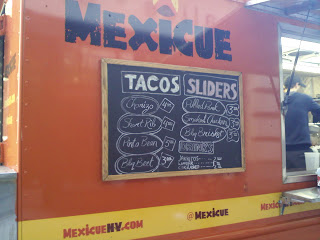I previously wrote about OpenTable's IPO
here and
here. If you had gone in on some of that, you wouldn't be doing too bad right now.
September 23, 2010 12:05 PM
The online reservation service doesn't deserve its $1.5 billion valuation, at least not yet. But neither does it deserve to be written off as an over-hyped fad.opentable
By Kevin Kelleher, contributor
Tuesday marked another ho-hum milestone for OpenTable: The stock closed at yet another record high.
In the 20 months since its IPO, OpenTable (OPEN) has more than tripled its $20 offering price to Tuesday's close of $66.33. The 12-year-old company has amassed a $1.5 billion market cap, bigger than many publicly-traded restaurant chains like Jack in the Box (JACK), Domino's Pizza (DPZ), P.F. Chang's (PFCB), and it's closing in fast on Wendy's (WEN) $1.8 million market value.
What's going on? Has the company, which books restaurant reservations online, hit on some kind of secret sauce for success? Or is it 1999 all over again, as some analysts speculate, with little-known online enterprises achieving stratospheric valuations before crashing back to earth?
The truth is it's little of both. OpenTable's valuation has surely been driven to unsustainable levels. The stock trades at 201 times its 2009 earnings and 73 times its estimated 2011 earnings. Amazon, another e-commerce star often criticized as being overvalued, trades at 43 times its 2011 earnings.
OpenTable's surge has been exacerbated by a battle raging between bullish momentum investors and bearish short investors. Just as its shares have climbed, the short interest on the stock has also soared, rising from 331,000 shares (equal to one day of average volume) a year ago to 3.8 million shares (or 12 times average daily volume) today. The bears continue building up their short positions, patiently awaiting the inevitable correction, but they keep getting squeezed out by momentum buyers.
E-commerce 2.0
Such technical factors will keep OpenTable volatile for some time. But it would be a mistake to dismiss the company as a proverbial flash in the pan. Unlike many overnight sensations from the Internet sector, OpenTable has a growing customer base, smart management and a steady record of rising profits. But more importantly, the company is emblematic of a trend in e-commerce that is only in its infancy.
For the past 15 years, online commerce has centered around the business of selling goods through the web, creating an online alternative to the so-called brick-and-mortar model of traditional retailing. Amazon (AMZN) perfected this business model, wringing new efficiencies from distribution and slashing prices. Over time, many large brick-and-mortar retailers realized they needed to connect with consumers online as well, or risk being left behind. Blockbuster, which lost business to Netflix (NFLX) and filed for bankruptcy Thursday, is just the latest example.
But there was a large portion of the consumer market that was left out of this revolution: the small, independently-owned businesses like restaurants and retail shops. OpenTable was one of the first companies to connect consumers with these brick-and-mortar holdouts on a large scale. It took a traditional chore -- phoning a restaurant for reservations -- and simplified it through the web.
Opentable, which is free for diners to use, charges restaurants a series of fees. The company breaks them down as a one-time installation fee averaging between $600 and $700 a month, a monthly subscription fee averaging $270 and additional fees charged per diner seated. Restaurateurs say they pay an average of $1,500 to $2,000 a month for the service.
The idea resonates with diners and restaurateurs -- OpenTable's revenue jumped by 35% in the first half of 2010 from the same period in 2009, while profit grew nearly fivefold. Operating margin rose to 18% from 7% in that period, so OpenTable's growth is coming in a way that's adding to profits.
Other recent start-ups have also tapped into this new e-commerce trend. Yelp brought Amazon-like customer reviews to restaurants and mom-and-pop retailers. And Groupon has struck gold by offering online deal-of-the-day coupons that connect consumers and local retailers. Other startups like Foursquare are building in business promotions to their location-based mobile apps, though few have caught on like Groupon. What separates the success stories from the also-rans is their ability to tap into the mobile web, which can help on-the-go consumers find, research and connect with local shops and restaurants.
OpenTable is pushing into these areas as well. Its iPhone app, for example, allows users to write reviews of restaurants and read those of others. It recently launched Spotlight, a Groupon-like daily deal service that could bring in new revenue. Diners tend to book reservations only at popular and high-end restaurants. Since most restaurants seat diners without reservations, they have no incentive to pay OpenTable fees to book reservations that no one needs. But offering discounts to diners could help OpenTable broaden its customer base.
OpenTable isn't the only one with this idea. It's facing competition from Zagat Survey, which is offering its own dining deals, with the twist that as more people sign up the discount grows. And Urbanspoon, backed by IAC, offers a rival reservation-booking service along with its restaurant reviews. Only Urbanspoon's service, called Rezbook, has both an iPad app and services that don't require the expensive software OpenTable makes restaurants use.
OpenTable future is likely bright, but its jaw-dropping stock surge is misleading in two ways. The company doesn't deserve a $1.5 billion valuation, at least not today. But neither does it deserve to be written off as an over-hyped fad. It's tapped into a new area of e-commerce that promises to deliver sustainable growth for years to come.
Link to article
here.






